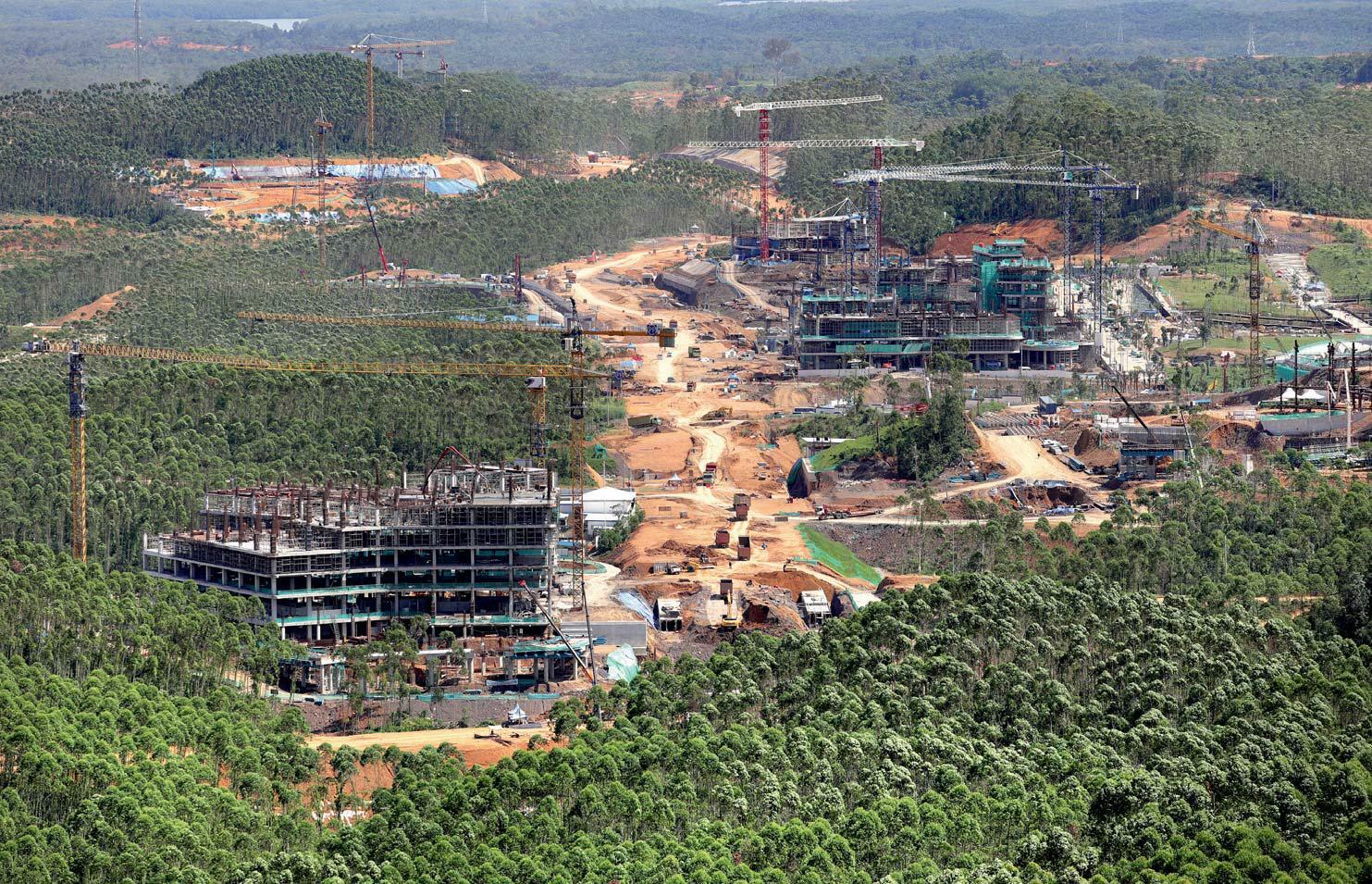
In eastern Borneo, beyond the thick jungle forests, an epic building project is under way. Giant trucks, cement mixers and diggers lumber along battered roads. Cranes tower overhead. Yellow dust clouds the air, caking everything in reach: the leaves of eucalyptus trees, the sides of passing vehicles and the homes of nearby residents.
This site a 2,560 sq km area encompassing industrial plantations, mines, Indigenous communities and agricultural land-is to form Nusantara, Indonesia's new administrative capital.
The decision to move the capital to a new site was taken because Jakarta is rapidly sinking. In a single year, some areas of the capital subside by as much to 11cm, a problem driven by excessive groundwater extraction and rapid urban development. On top of this, the climate crisis is making storm surges and extreme weather more likely, and causing sea levels to rise.
By 2050, about 25% of the capital could be submerged if there is no effective action, according to a study by the government's National Research and Innovation Agency.
Nusantara's location, in the province of East Kalimantan, means the new capital will be at the centre of Indonesia's archipelago of 17,000 islands, to help spread power and wealth more evenly across the country.
The development is welcomed by many in the wider province, who hope it will bring investment and better infrastructure. Officials promise the capital will be a modern, sustainable forest city that coexists with nature and is carbon neutral by 2045.
However, critics say the development is too ambitious and rushed. They also warn it could come with high costs, not only to the state - which will fund 20% of the $32bn bill - but also to the surrounding environment and local Indigenous communities.
This story is from the {{IssueName}} edition of {{MagazineName}}.
Start your 7-day Magzter GOLD free trial to access thousands of curated premium stories, and 9,000+ magazines and newspapers.
Already a subscriber ? Sign In
This story is from the {{IssueName}} edition of {{MagazineName}}.
Start your 7-day Magzter GOLD free trial to access thousands of curated premium stories, and 9,000+ magazines and newspapers.
Already a subscriber? Sign In

If kids get protected from online harm, how about the rest of us?
The Australian government has proposed a ban on social media for all citizens under 16.

'It's not drought - it's looting'
Spain is increasingly either parched or flooded - and one group is profiting from these extremes: the thirsty multinational companies forcing angry citizens to pay for water in bottles.

Life in the grey Zone
Neonatal care has advanced so far that babies born as early as 21 weeks have survived. But is this type of care always the right thing to do?

Out of tune? Band Aid under fire for Africa tropes as it turns 40
Forty years ago this month, a group of pop stars gathered at a west London studio to record a single that would raise millions, inspire further starry projects, and ultimately change charity fundraising in the UK.

Deaths shine spotlight on risks of drinking on party trail
Vang Vieng is an unlikely party hub. Surrounded by striking limestone mountains and caves in central Laos, it morphed from a small farming town to a hedonistic tourist destination in the early 2000s.

Different strokes My strange and emotional week with an AI pet
Moflin can develop a personality and build a rapport with its owner - and doesn't need food or exercise. But is it comforting or alienating?

Strike zone Waking up to the rising threat of lightning
When the Barbados National Archives, home to one of the world's most significant collections of documents from the transatlantic slave trade, reported in June that it had been struck by lightning, it received sympathy and offers of support locally and internationally.

Cheap pints and sticky carpets: the old-school pub is back
In the Palm Tree pub, east London, barman Alf is taking only cash at the rattling 1960s till.

Brain gain Can a radical tax scheme convince the country's brightest to stay?
In the autumn of 2018, I moved to Lisbon for a month-long course at the Universidade .de Lisboa.

Fear and sympathy in small town divided over asylum camp
A year after anti-immigration riots, a site for asylum seekers faces hostility while some locals try to help new arrivals